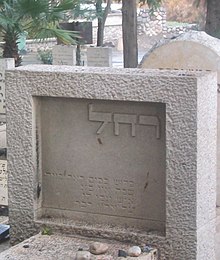Rachel (poet)
Rachel (actually Rachel Bluwstein , Russian Блувштейн, Рахель ; born September 20 . Jul / 2. October 1890 greg. In Saratov , Samara Governorate , Russian Empire ; † 16 April 1931 in Tel Aviv , Israel ) was a Hebrew poet and Zionist .
life and work
Rachel grew up in Poltava . At the age of 15 she started writing poetry in Russian and also studied painting. In 1909 she emigrated to Erez Israel with her sister Shoschana , at that time part of the Ottoman Empire . The two were on their way to Italy, where she wanted to study art and philosophy, but decided to participate in building the Jewish state and initially settled in Rehovot down where they Ivrit learned in kindergarten. Rachel wanted to learn farming and so she moved to an agricultural school on the Kinneret farm on the Sea of Galilee . Here she met Aharon David Gordon and dedicated her first Hebrew poem to him. She also had an affair here with Salman Rubashov, who later changed his name to Salman Shazar and became the third Israeli president .
In 1913 she traveled to France to study agronomy at the University of Toulouse . During the First World War, as a Russian, she was forced to leave the Ottoman Empire as a hostile foreigner and returned to Russia, where she gave lessons to Jewish refugee children. In 1919 she returned to Israel on the "Ruslan", the first Soviet ship to sail this route after the war , and wanted to settle in Kibbutz Degania . But after a short time, symptoms of tuberculosis were discovered in her . Since the disease was considered incurable at the time, she was immediately expelled from the kibbutz and stayed in different places: in Zefat , Jerusalem and Tel Aviv . In Gedera, south of Tel Aviv, she was finally taken to an asylum for people with tuberculosis. She died at the age of 40 in Hadassah Hospital in Tel Aviv and, as she wished, was buried in the Kinneret Cemetery with a view over the Sea of Galilee.
Rachel was one of the first Hebrew language writers to use a conversational tone in her works . She draws her knowledge of Hebrew from colloquial language as well as from Biblical Hebrew. Her first poems are influenced by contemporary Russian literature ( Alexander Blok , Anna Akhmatova and Sergei Jessenin ). Her poems are always short, elegiac and nostalgic in tone; many reflect the pessimism of a young poet who is exposed to death. They mostly play in the rural surroundings of Israel and speak of the difficulties and sufferings of her life as a pioneer in Israel who works in the countryside to make it a home for her people. Many of her poems have been set to music and are still in Israel today known. She also translated Russian, Yiddish, and French poems into Hebrew and occasionally wrote reviews. Most of her poems were in the newspaper Davar published.
Rachel's portrait and an excerpt from her poem Kinneret have been on view on Israeli banknotes worth 20 shekels since 2017 .
Rachel's poems, which are compulsory in Israeli schools, were also translated into Arabic for the Arab population of Israel in 2019 .
literature
- Encyclopedia Judaica , Vol. 13, pp. 1516-1517.
Web links
Individual evidence
- ↑ a b See Hebrew Poems for a Muslim Nation , in: Israel heute, Sept. 20, 2019
- ^ Bank of Israel releases two new notes , Ynetnews.com, accessed February 1, 2017
| personal data | |
|---|---|
| SURNAME | Rachel |
| ALTERNATIVE NAMES | Bluwstein, Rachel; Блувштейн, Рахель (Russian spelling) |
| BRIEF DESCRIPTION | Hebrew poet and Zionist |
| DATE OF BIRTH | October 2, 1890 |
| PLACE OF BIRTH | Saratov , Russian Empire |
| DATE OF DEATH | April 16, 1931 |
| Place of death | Tel Aviv , Israel |

